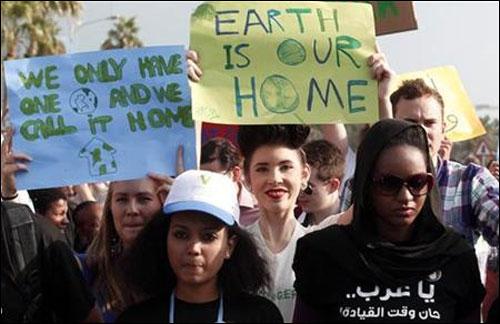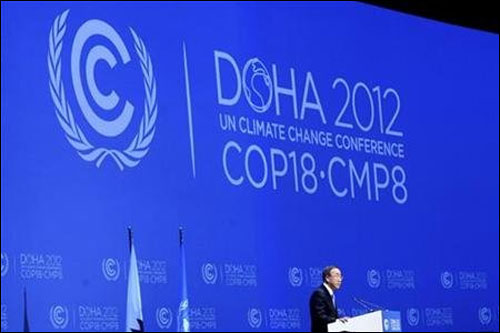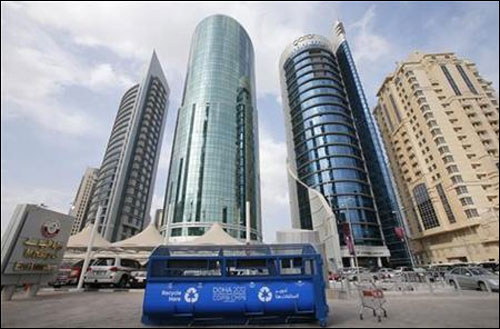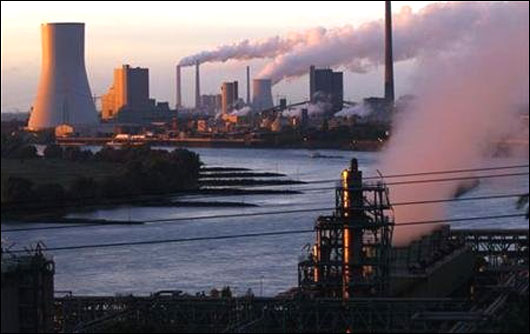Photographs: Mohammed Dabbous/Reuters Shyam Saran
India has completely failed to uphold its key interests at climate talks, which have fallen short of their 20-year mission, Shyam Saran.
The 18th Conference of the Parties (COP) to the United Nations Framework Convention on Climate Change (UNFCCC) met in Doha from November 26 to December 8 and adopted a set of eight decisions, which the Qatari hosts optimistically christened the Doha Climate Gateway.
These decisions brought to a conclusion the two-track negotiations on the Bali Road Map, which were mandated by COP15 in 2007 as a response to the heightened threat of climate change.
The first track was aimed at evolving a Long-Term Co-operative Action Plan to enhance the implementation of the UNFCCC through a comprehensive package of mitigation and adaptation measures enabled through both financial and technological resource transfers to developing countries.
The second track was to negotiate a second commitment period under the Kyoto Protocol, starting 2013, with developed, industrialised countries pledging individual and overall targets for absolute reductions in their greenhouse gas emissions beyond what they had pledged and achieved in the first commitment period of 2008-12.
The Intergovernmental Panel on Climate Change (IPCC) had recommended a minimum of 25 to 40 per cent reductions in these emissions by 2020 against the 1990 level in order to limit global temperature rise to two degrees Celsius by mid-century.
Click on NEXT for more...
Doha's 'gateway' to nowhere
Photographs: Fadi Al-Assaad/Reuters
These negotiations have now been declared concluded at Doha - but the Bali Road Map, far from being implemented, has been effectively shelved. In its place a new negotiating track, the so-called Durban Platform, has been launched with a significantly watered-down mandate, which in reality repudiates the principles and provisions of the UNFCCC.
The Kyoto Protocol survives until 2020, when a new climate regime will begin to be implemented. However, the pledges announced so far will, if fully implemented, constitute only an 18 per cent reduction in emissions by 2020 compared to 1990. In the meantime, the US remains outside the Kyoto Protocol, while Canada and Japan have refused to announce targets for the second commitment period.
Doha marks the demise of the process launched in 1992 by the UNFCCC to address the global challenge of climate change. It represented a collaborative, multilateral effort to deal with a looming threat to human survival through a legal instrument that incorporated the principle of equity at its core.
At Doha the UNFCCC stands eviscerated; even a mere reference to its principles in the Outcome document was fiercely contested.
The EU commissioner for climate change was bold enough to assert that there was now a need for "updating the regime with twenty-first century realities and evolving capabilities in the contemporary context". In other words, the UNFCCC had become outdated and anachronistic.
Click on NEXT for more...
Doha's 'gateway' to nowhere
Photographs: Mohammed Dabbous/Reuters
There has been a relentless attrition process at work, with developing countries ceding ground on key issues since the Copenhagen climate summit in 2009 and at subsequent COP meetings at Cancun, Durban and now Doha.
The developed countries have been successful in wiping the slate almost clean and initiating a negotiating process in which the strong legal safeguards available to the developing countries in the UNFCCC have been virtually eliminated.
The new reality is that developing countries, including India, have acquiesced in the framing of a new global climate regime. Such a regime will impose symmetrical, if not equal, obligations on all countries to undertake emission reduction obligations.
The overriding priority to poverty reduction and achieving economic and social development, which the UNFCCC categorically recognised, will no longer serve as an operative safeguard. The principle of non-reciprocal obligations, based on equity, has been forfeited. In conceding legal symmetry, developing countries have also compromised on their legal entitlement to financial resources and technology transfer to enable them to take climate change action.
The Doha outcome reflects this new reality. No financial commitments have been made, and the very notion of technology transfer has been rejected. Nor have the developed countries agreed to provide any credible assurance that they will not resort to unilateral trade measures under the guise of climate change action. Therefore, one needs to acknowledge that India has not been able to uphold its key interests in these negotiations.
Click on NEXT for more...
Doha's 'gateway' to nowhere
Photographs: Fadi Al-Assaad/Reuters
We are now on the threshold of a single negotiating process under the ad hoc working group on the Durban Platform mandated to come up with a new climate change regime by 2015. It is imperative that we review our negotiating strategy so that we are able to salvage some lost ground and safeguard our vital interests.
To begin with, we need to acknowledge that what we are engaged in are full-fledged economic negotiations rather than technical deliberations on climate change. We must ensure that we do not acquiesce in a climate regime that diminishes, not enhances, our prospects for economic development.
If we have to take on emission reduction obligations post-2020, then it may be in our interest to link this with an insistence on a robust regime with a strong compliance procedure rather than accept the approach, exemplified by the US, which wishes to establish a "pledge and review" regime with no compliance mechanism.
This is precisely because we will be the most severely impacted by climate change.
Click on NEXT for more...
Doha's 'gateway' to nowhere
Photographs: Ina Fassbender/Reuters
It is also necessary to engage in sustained and vigorous diplomacy to build and maintain a critical mass of support among like-minded and developing countries for our negotiating posture. Our lack of consistency in the recent past has confused and even alienated some of our partners.
Our display of flexibility to gain support from some of the developed countries has only led to even greater erosion of our position in the negotiations without any tangible gains.
While reassessing its strategy at the multilateral negotiations on climate change, India must nevertheless continue to pursue the vigorous implementation of its ambitious National Action Plan on Climate Change. The plan constitutes a visionary blueprint for sustainable development of our country and has its own compelling rationale.
This would also lend greater credibility and confidence to our negotiating posture in the multilateral negotiations.
The writer, a former foreign secretary, is currently chairman of RIS and a senior fellow at the Centre for Policy Research, New Delhi







article